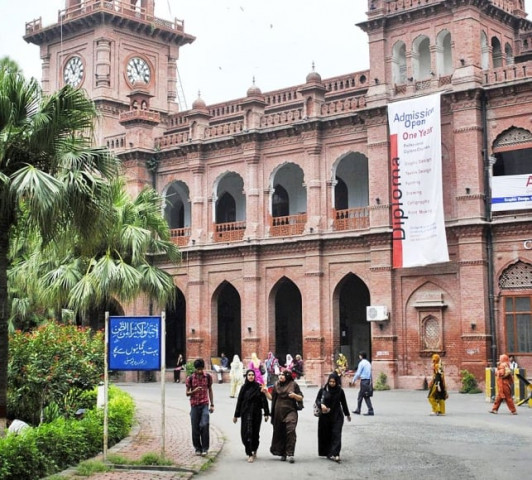Booming business: Quality a casualty as colleges mint money
Colleges have been granted affiliations by public varsities without regard to standards

Colleges have been granted affiliations by public varsities without regard to standards. PHOTO: EXPRESS
Education has become a profitable business. Unchecked growth of colleges affiliated with various government universities throughout the country is having an adverse effect on the quality of education.
A number of these colleges have been granted affiliations without proper monitoring of required facilities.
Ibne Sina, a private college in Sector G-11, functions from two tiny rooms. It claims to be affiliated with the University of Punjab and issues bachelors and masters degrees in various programmes. When the receptionist was asked about missing infrastructure and students, he replied that classes were usually held keeping candidates’ ease in mind, while there was no need for a [proper] building.
Dozens of such private and public colleges operate in the capital and are affiliated with government universities in the Punjab and Khyber-Pakhtunkhwa (K-P).

Around 57 public universities have granted affiliations to 3,328 colleges across the country. The biggest concern when it comes to these degree-granting institutes is the quality of education and lack of checks.
Only government universities reserve the authority to grant affiliation to colleges in both the private and public sectors.
Persisting problem
Quaid-i-Azam University Vice-Chancellor Javed Ashraf has frequently promised to sort out the various problems when it comes to administration of examinations, curriculum and faculty development in various colleges of the capital affiliated with the university, but the anomalies and problems remain.
The rules concerning grant of affiliation status are so loose that a public university can grant such a status to any college in the country.

The highest number of affiliations has been given by the Punjab University, Karachi University, University of Peshawar, University of Sargodha (UoS) and the University of Balochistan.
Some programmes being offered by these colleges are not even offered by the parent universities they are affiliated with.
Lack of infrastructure, laboratories and other basic facilities are some of the issues the universities need to look into while granting affiliation to colleges.
Lack of facilities is a problem that not only concerns these colleges but also the various sub-campuses of the universities themselves.
The University of Gujrat recently planned to shift four science disciplines from its city campuses to the main Hafiz Hayat campus due to the lack of a laboratory.
Around 495 colleges in Punjab are affiliated with the UoS. The varsity’s vice-chancellor, Muhammad Akram Chaudhary, termed the process of affiliation a healthy competition to impart quality education. He said UoS’ criterion for grant of affiliation was rigorous and transparent. “No such affiliation is approved unless faculty, infrastructure and proper laboratory facility is available,” the VC claimed.
He said they had cancelled affiliation of 72 colleges for not maintaining the required criteria. “The Punjab Higher Education Department should look into the matter before it becomes an uncontrollable disaster,” Chaudhary warned.
HEC’s role
The Higher Education Commission (HEC) says it only visits colleges within the limits of Islamabad for monitoring and inspection.
However, for colleges established in provinces, the relevant university is responsible for such visits in light of HEC’s criteria guidelines for affiliation, said an HEC official requesting anonymity.
K-P Minister for Higher Education Mushtaq Ghani and Punjab Higher Education Department Secretary Irum Bukhari did not respond to request for comments.
Published in The Express Tribune, August 9th, 2015.



















COMMENTS
Comments are moderated and generally will be posted if they are on-topic and not abusive.
For more information, please see our Comments FAQ